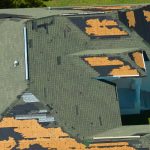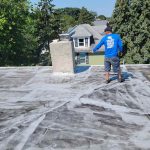As renewable energy continues to gain traction, more homeowners are turning to solar panels as a sustainable way to power their homes. However, the integration of solar panels with your roofing system involves careful consideration and planning. In this blog post, Super Duty Roofing will explore the impact of solar panels on roofing, highlighting the integration process, benefits, and key considerations to ensure a successful installation that maximizes both energy efficiency and roof health.
Integrating Solar Panels with Your Roof
Integrating solar panels with your roof requires collaboration between roofing and solar panel installation experts. Here are the essential steps involved in the process:
- Roof Assessment: Before installing solar panels, it’s crucial to assess the condition of your roof. A professional inspection by Super Duty Roofing will determine if your roof can support the additional weight and if any repairs or reinforcements are needed. This step ensures the longevity and durability of both the roof and the solar panels.
- Design and Planning: The design phase involves determining the optimal placement of solar panels for maximum energy efficiency. Factors such as roof orientation, angle, and shading from trees or other structures are considered. Collaborating with solar panel installers, Super Duty Roofing ensures the design is compatible with your roof’s structure.
- Installation: During installation, brackets are attached to the roof to secure the solar panels. It’s important that this process is done correctly to prevent leaks or damage. Super Duty Roofing’s expertise ensures that the installation is seamless, maintaining the integrity of your roof while providing a solid foundation for the panels.
Benefits of Solar Panels on Roofing for Homes
- Energy Savings: One of the primary benefits of solar panels is the significant reduction in energy bills. Solar panels harness the sun’s energy to power your home, decreasing reliance on grid electricity and lowering monthly expenses.
- Environmental Impact: Solar energy is a clean, renewable resource that reduces your carbon footprint. By installing solar panels, you contribute to environmental conservation by decreasing greenhouse gas emissions and reliance on fossil fuels.
- Increased Property Value: Homes equipped with solar panels typically see an increase in property value. Prospective buyers are often willing to pay a premium for energy-efficient homes with lower utility costs.
- Roof Protection: Solar panels can actually protect your roof from the elements. By covering a portion of the roof, they shield it from UV rays, rain, and snow, potentially extending the lifespan of your roofing materials.
Considerations for Solar Panel Installation
- Roof Condition: Ensure your roof is in good condition before installing solar panels. An older roof nearing the end of its lifespan should be replaced to avoid the need for panel removal and reinstallation later.
- Weight and Structural Integrity: Solar panels add weight to your roof. A structural assessment by Super Duty Roofing will determine if your roof can support the additional load. Reinforcements may be necessary to ensure safety and stability.
- Warranty and Insurance: Check the warranties of both your roofing materials and solar panels. Understand how the installation might affect these warranties and consult with your insurance provider to ensure coverage for your new system.
- Maintenance: Solar panels require minimal maintenance, but it’s essential to ensure they remain clean and unobstructed. Additionally, regular roof inspections by Super Duty Roofing will help identify any issues that may arise and ensure both the panels and roof remain in excellent condition.
Potential Challenges and How to Address Them
- Roof Leaks: Improper installation can lead to roof leaks. To prevent this, work with experienced professionals like Super Duty Roofing and certified solar panel installers who follow best practices and use high-quality materials.
- Compatibility: Not all roofing materials are ideal for solar panel installation. Materials like metal and asphalt shingles are generally more compatible than others. Super Duty Roofing can advise on the best options for your specific roof type.
- Local Regulations: Be aware of local building codes and regulations regarding solar panel installations. Working with professionals ensures compliance with all necessary permits and regulations.
Conclusion
Integrating solar panels with your roofing system offers numerous benefits, from energy savings and environmental impact to increased property value and roof protection. However, proper planning and professional installation are crucial to maximizing these benefits and ensuring the longevity of both your roof and solar panels. Super Duty Roofing is committed to providing expert guidance and high-quality service to help you seamlessly integrate solar panels with your roofing system. Contact us today to learn more about our services and start your journey towards a more sustainable and energy-efficient home.




















